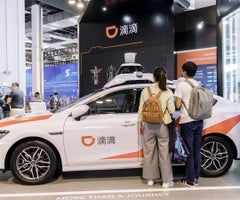MI SELECCIÓN DE NOTICIAS
Noticias personalizadas, de acuerdo a sus temas de interés

Funding round led by SoftBank Group’s Vision Fund 2
Chinese ride-hailing giant Didi Chuxing Technology Co. raised more than $500 million in a funding round led by SoftBank Group Corp. 9984 0.10% for its autonomous-driving subsidiary, the company said Friday, as it competes with well-backed U.S. startups over self-driving technology.
The fresh boost in capital led by SoftBank’s Vision Fund 2, the successor to the Japanese tech investor’s $100 billion Vision Fund, will be used to test, develop and deploy Didi’s autonomous-driving technology, Didi said. The company is also planning to work with auto-industry partners to mass-produce self-driving cars.
Didi, which spun off its self-driving division last August, faces a number of heavyweight rivals in the U.S., where funding is consolidating around a few star players, including Waymo LLC, the driverless car unit of Alphabet Inc., and Argo AI LLC, backed by Ford Motor Co.
Earlier this month, Waymo announced $750 million in fresh capital, while Argo AI is expecting a $2.6 billion investment from Volkswagen AG to close this summer. Another well-funded industry leader, General Motors Co. -backed Cruise, has raised more than $7 billion. Amazon.com Inc. too has invested heavily in driverless vehicle technology and is in talks to buy Zoox Inc., which is working to develop the hardware and software needed to create electric-powered robot taxis.
Didi’s latest round of funding also comes as the company emerges from China’s coronavirus lockdown, with traffic and business picking up nationwide. But Didi’s ride volume is still only 60% to 70% of its previrus levels, a person familiar with the company said recently.
Didi is the biggest investment made by SoftBank’s first Vision Fund, which has poured around $12 billion into the company for a 20% stake. That makes the fate of Didi hugely important to SoftBank-especially since the fund has been struggling recently as the coronavirus pandemic pummels investments that many had seen as already overpriced.
SoftBank started Vision Fund 2, a successor to its $100 billion Vision Fund, at the end of last year. Initially, it was also planned to be a hundred-billion-dollar pool of capital. But those plans fell apart during the second half of last year, as investors turned wary of the kind of fast-growing, heavy-spending startups the Vision Fund was backing.
Since then, SoftBank has been funding Vision Fund 2 with its own money and investing on a much smaller scale than the billion-dollar checks it often wrote from the first Vision Fund.
Currently, Didi has open-road testing licenses in California, as well as in several cities in China. It also plans to start piloting a robotaxi service in Shanghai, where users will be able to hail autonomous vehicles through the company’s ride-hailing app.
Didi first began developing and testing self-driving vehicles in 2016 and opened its main U.S. research facility in Mountain View, Calif., in 2017 to focus on developing artificial intelligence, including autonomous driving.
By Eva Xiao
Los activos refugio, incluidos los bonos y el dólar, renunciaron a algunas ganancias tempranas después de que los medios de comunicación iraníes parecieran minimizar el impacto de los ataques israelíes.
La medida de la actividad manufacturera en marzo del Institute for Supply Management en EE.UU. pasó a territorio de expansión debido a una mayor demanda
"Países expuestos a mercados de materias primas con elasticidades relativamente bajas, en especial los metales, podrían requerir colchones fiscales y espacio en su política monetaria", sostuvo el informe.